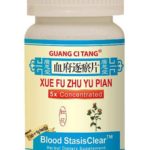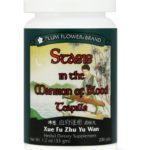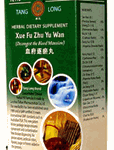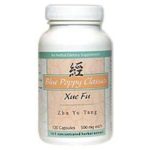Disclaimer For educational purposes only. Do not use as medical advice
AboutChinese MedicineCaution/Notes
| Health Benefits |
| For: Chest tightness • Angina Pectoris • Coronary Heart Disease • Chest Pains • Rheumatic Heart Disease • Dry Heaves • Warmth in the Chest |
| Atributes: |
| Category: Invigorate the Blood ⌕ |
| Subcategory: Invigorate Blood and Dispel Blood Stasis ⌕ Source: Yi Lin Gai Cuo |
| Actions: Invigorates blood • Dispels blood stagnation • Spreads liver qi • Unblocks channels • Moves Qi upward/downward • Stop pain |
| Diagnosis |
| Tongue: dark red • purple • dark spots on the sides Pulse:choppy • tight • wiry Other: |
| Patterns: Blood stagnation • Blood stasis • Qi stagnation |
| Indications: blood stasis in the chest area (above diaphragm) • chest pain • headaches |
| Contraindications: Pregnancy |
| Description |
| Name Variations: Xue Fu Zhu Yu Tang, 血府逐瘀汤, Drive Out Stasis in the Mansion of Blood Decoction, |
| Herb List: Tao Ren • Hong Hua • Dang Gui • Chuan Xiong • Chi Shao • Chuan Niu Xi • Chai Hu • Jie Geng • Zhi Ke • Sheng Di Huang • Gan Cao |
| Description: Mostly a combinations of Tao Hong Si Wu Tang and Si Ni San • Tao Ren and Hong Hua are chiefs and good for removing blood stasis. • Chi Shao, Dang Gui (deputy) - invigorate blood lower body • Sheng Di Huang-nourish blood, clear heat • Dispel blood stasis without injuring yin and blood• Chuan Niu Xi - downward movement of blood • Chai Hu, Jie Geng, Zhi Ke - moves Qi, especially smoothing LV Qi • Jie Gang - ascending Qi to Upper Jiao. |
| Related Formulas: Combinations of Tao Hong Si Wu Tang and Si Ni San • Attachment formulas: Tong Qiao Huo Xue Tang, Ge Xia Zhu Yu Tang, Shao Fu Zhu Yu Tang, Shen Tong Zhu Yu Tang |
| Herbs |
Cat/Dosage |
Actions |
Attributes |
| Tao Ren • Peach Kernel • 桃仁 ♠ |
Regulate Blood - Invigorate
12g |
Break up blood stasis • Invigorate blood • Treat abscess • Moisten intestines • Unblock bowels |
antithrombatic • anti-inflammatory • antitussive • antiallergic • antiparasitic |
| Hong Hua • Safflower Flower • 红花 ♠ |
Regulate Blood - Invigorate
9g |
Invigorate blood • Unblock menses • Dispel blood stasis • Relieve painHong Hua is better at dispersing blood stagnation to open channels/collaterals and extremities pain • Tao Ren better for blood stagnation in the abs and for lung and intestine abscess |
antiplatelet • antithrombatic • heart stimulant • CNS suppressant • uterine stimulant • adaptogenic |
| Dang Gui • Chinese Angelica • 当归 ♥ |
Tonify Blood
9g |
Tonify blood • Move Blood and Qi • Regulate menses • Invigorate blood • Dispel cold • Unblock bowels • Reduce abscess swelling • Alleviate pain • Clear pus • Generate flesh • Moisten intestines Dang Gui Shen (body) - tonify blood • Quan Dang Gui - harmonize blood (tonify and invigorate) • Dang Gui Wei (tail) - invigorate blood • According to the Board Exams, this herb does not affect estrogen because it has not yet been determined in which way it does affect it. However, there are numerous research articles on Dang Gui and estrogen. |
phytoestrogen • antispasmodic • cholagogue • antibaterial • antiviral • antiobesity • anti-inflammatory • antifungal • mild laxative • immune system boost |
| Chuan Xiong • Szechuan Lovage • 川芎 ♠ |
Regulate Blood - Invigorate
4.5g |
Relieve pain • Expel Wind • Invigorate blood • Moves qiAvailable as injections |
Anticoagulant • Antiplatelet • Analgesic • Antitussive • Anti-inflammatory • Hypotensive • Sedative |
| Chi Shao • Red Peony Root • 赤芍 ♥ |
Regulate Blood - Invigorate
6g |
Clear heat • Cool blood • Invigorate blood • Dispel blood stasis • Clear liver fire |
antiplatelet • antithrombatic • antibiotic • CNS suppressant • sedative • antipyretic • antiseizure • antispasmodic |
| Chuan Niu Xi • Cyathula • ⽜膝♥ |
Regulate Blood - Invigorate
9g |
Move blood downward • Invigorate blood • Dispel stasis • Tonify Liver • Tonify Kidney • Strengthen bones and sinews • Clears damp heat in lower jiao • Expel wind • Drain dampness • Promote blood circulation |
emmenagogue • vasodilator |
| Chai Hu • Thorowax • 柴胡♣ |
Release Exterior Wind Heat
3g |
Harmonize interior and exterior • Reduce fevers • Reduce chills • Soothe liver Qi • Clear muscle layer heat • Tonify stomach QiPungent and dispersing |
Antibiotic • Antipyretic • Anti-inflammatory • Antibaterial • Antiviral • Analgesic • Hepatoprotective • Immunemodulatory • Chemoprotective • Anti-tumor • Cholagogic • Sedative • Immunostimulate |
| Jie Geng • Platycodon Root • 桔梗♣ |
Phlegm Cold
4.5g |
Disperse Lung qi • Expel mucus • Soothe sore throat • Guide other herbs to upper body • Treat abscesses • Move Qi upward |
Expectorant • Hypoglycemic • Anticholesterol • Antifungal |
| Zhǐ Ké • Ripe Bitter Orange • 枳壳 ♣ |
Regulate Qi
6g |
Dissolves Qi stagnation • Clear congestion • Relieve abdominal distention |
antiplatelet • antithrombatic • hypertensive • diuretic • bronchodilator • antineoplastic |
| Sheng Di Huang • Rehmannia • 生地黄♣ |
Clear Heat Cool Blood
9g |
Clear heat • Cools hot blood (nosebleeds, bloody vomit, bloody urine, bloody stool) • Nourish Yin • Cool heart fire • Generate fluids |
Immune system booster • coagulant • antidiabetic • hepatoprotective • hypotensive • anti-aging • antioxidant • antihistamine • emmenagogue |
| Gan Cao • Licorice Root • 甘草♣ |
Tonify Qi
3g |
Tonify Spleen Qi • Tonify Heart qi • Clear heat • Resolve toxicity • Stop cough • Dispel phlegm • Lubricate lungs • Stop wheezing • Reduce spasm • Relieve pain • Harmonize other herb effectsEnters all 12 channels, often serve as envoy in a formula. |
Hypoglycemic • Antiarrhythmic • Expectorant • Antidiarrheal • Antiulcer • Hepatoprotective • Immunostimulant • Antitussive • Antiviral • Detox • Demulcent • Anti-inflammatory • Laxative • Emmenagogue • Antimicrobial • Spasmolytic |
| ♠ King/Chief ♥ Minister/Deputy ♣ Assistant ♦ Envoy |
| Directions: Normal decoction |
| Modifications |
For |
| + Man Jing Zi + Bai Ji Li |
Headaches |
| + Yi Jin + Xie Bai |
Pain in the hypochondria |
| + Yu Jin + Dan Shen |
Abdominal masses |
| – Jie Geng + Xiang Fu + Yi Mu Cao |
Amenorrhea or dysmenorrhea 31 |
| – Chuan Niu Xi – Jie Geng |
Rheumatic heart disease |
| + amount of Hong Hua, Chuan Xiong, and Dan Shen |
Angina pectoris from coronary artery disease |
| + Quan Xie + Wu Gong + Di Long + San Leng + E Zhu |
Chronic pain with disease deep in collaterals 31 |
| + Chuan Lian Zi + Qing Pi + Xiang Fu |
Severe Qi stagnation 31 |
| + Dan Shen + Yu Jin + Mang Chong + Shui Zhi |
Hypochondrium mass accumulation 31 |
| Caution |
- Do not use during pregnancy
- Do not use with heavy menstrual flow
- Do not use when there are signs of hemorrhaging present.
- Do not combine with anti-coagulant drugs
ALERT: Contraindications of each herb - use with caution under these conditions:
Tao Ren: Pregnancy • Blood deficiency • Anticoagulant or anti antiplatelet drugs
Hong Hua: pregnancy • anticoagulant and antiplatelet drugs
Dang Gui: Autoimmune disorder • Pregnancy • Blood thinner drugs (Wafarin) • Diarrhea • Yin deficiency with heat • Dampness abdominal distention
Chuan Xiong: Pregnancy • Blood thinners • Fire from yin deficiency • Dry tongue • Dry mouth • Fever • Profuse menstrual bleeding • Spleen deficiency • Poor appetite • Nausea • Vomiting • Unexplained sweating
Chi Shao: Pregnancy • Incompatible with Li Lu • Deficiency cold • Antiplatelet and anticoagulant drugs
Chuan Niu Xi: Pregnancy • Menorrhagia • Spleen deficiency diarrhea • Kidney Qi deficiency with excessive menstruation • Spematorrhea
Chai Hu: Do not use as intramuscular injections • Liver fire • Hyperactive liver yang • Cytochrome P450, 2C9, 2E1, 2D6, and 3A4 • Greater than 19g may lead to liver injury
Jie Geng : Blood-stained mucus • Hypoglycemia • Tuberculosis • Anti-diabetic drugs
Zhǐ Ké: pregnancy • anticoagulant or antiplatelet drugs • Spleen/Stomach deficiencies • gastric ulcers • duodenal ulcers
Sheng Di Huang: Yang deficiency • Blood deficiency • Spleen deficiency • Stomach deficiency • Can be sticky and cloying, careful with digestive disorders
Gan Cao: High blood pressure • Low potassium • Pork • Seaweed • Chinese cabbage • Anti-diabetic drugs • Diuretic drugs • Low potassium |
| Notes |

Attachment formulas: Tong Qiao Huo Xue Tang, Ge Xia Zhu Yu Tang, Shao Fu Zhu Yu Tang, Shen Tong Zhu Yu Tang. Shen Tong Zhu Yu Tang is for whole body ache, particularly the limbs and back. (drawing credit: Lindsay Kunz) |






0 Comments